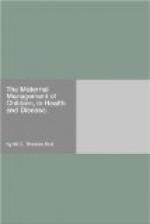If too large a quantity of food is given at each meal, or the meals are too frequently repeated, in both instances the stomach will become oppressed, wearied, and deranged; part of the food, perhaps, thrown up by vomiting, whilst the remainder, not having undergone the digestive process, will pass on into the bowels, irritate its delicate lining membrane, and produce flatulence, with griping, purging, and perhaps convulsions.
Then, again, improper and unsuitable food will be followed by precisely the same effects; and unless a judicious alteration be quickly made, remedies will not only have no influence over the disease, but the cause being continued, the disease will become most seriously aggravated.
It is, therefore, of the first importance to the well-doing of the child, that at this period, when the mother is about to substitute an artificial food for that of her own breast, she should first ascertain what kind of food suits the child best, and then the precise quantity which nature demands. Many cases might be cited, where children have never had a prescription written for them, simply because, these points having been attended to, their diet has been managed with judgment and care; whilst, on the other hand, others might be referred to, whose life has been hazarded, and all but lost, simply from injudicious dietetic management. Over-feeding, and improper articles of food, are more frequently productive, in their result, of anxious hours and distressing scenes to the parent, and of danger and loss of life to the child, than almost any other causes.
Teething.—The irritation caused by difficult teething may give rise to diarrhoea at the period when the infant is weaned, independently of the weaning itself. Such disorder of the bowels, if it manifestly occur from this cause, is a favourable circumstance, and should not be interfered with, unless indeed the attack be severe and aggravated, when medical aid becomes necessary. Slight diarrhoea then, during weaning, when it is fairly traceable to the cutting of a tooth (the heated and inflamed state of the gum will at once point to this as the source of the derangement), is of no consequence, but it must not be mistaken for disorder arising from other causes. Lancing the gum will at once, then, remove the cause, and generally cure the bowel complaint.
3. To the child brought up by hand.
Children brought up on an artificial diet are very liable to indigestion and bowel complaints; indeed none more so: and it is from these affections that so many of these infants perish. When, then, it is absolutely necessary from untoward circumstances to have recourse to this mode of nourishing the child, the rules and regulations laid down in the section on “Artificial Feeding” must be most strictly followed out, if the parent would hope to avoid disease and rear her child.[FN#37] And if these affections




